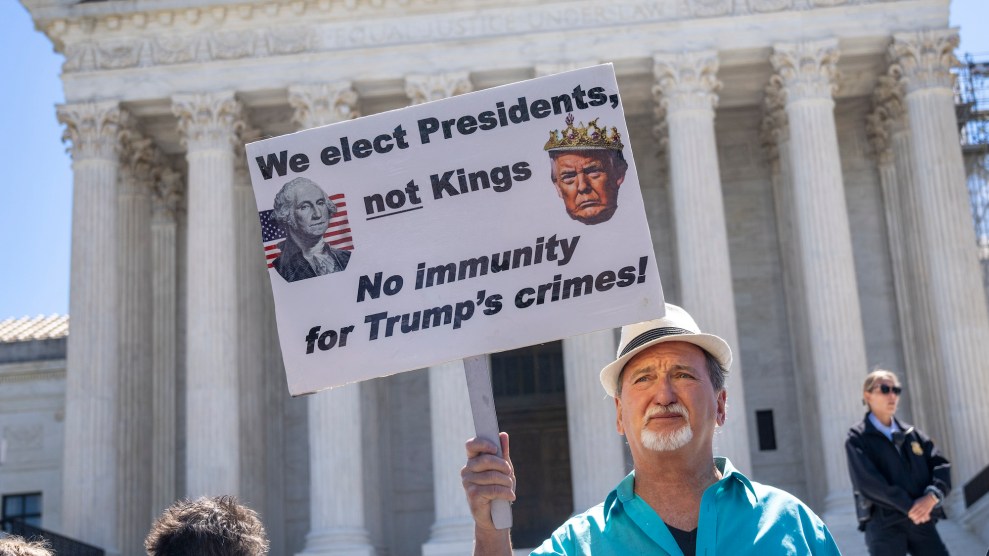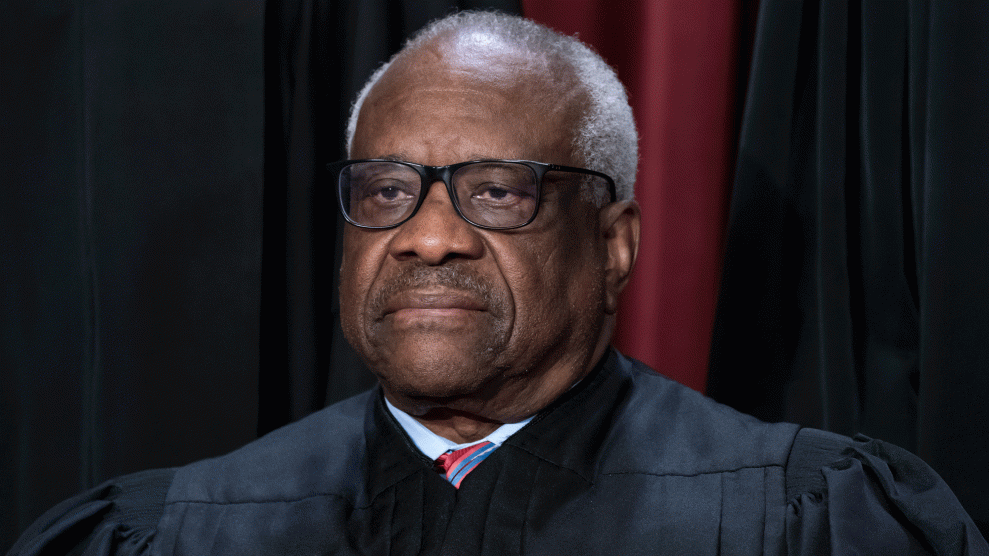
Gary Roush, of College Park, Md., protests outside of the Supreme Court, Monday, July 1, 2024, after court decisions were announced in Washington.Jacquelyn Martin/AP
On Monday, the Supreme Court ruled 6-3 that former President Donald Trump has broad immunity from prosecution for crimes he allegedly committed while in office. The majority decision provoked furious dissent from the court’s three liberal justices. “The President is now a King above the law,” wrote Justice Sonia Sotomayor, concluding, “With fear for our democracy, I dissent.”
The decision is deeply at odds with public opinion. Surveys by researchers at Bright Line Watch earlier this year found that fewer than 30 percent of Americans— including about half of all Republicans— believed the court should extend broad immunity to Trump and future presidents. The immunity decision joins a string of other, less-publicized opinions this term that will contribute to the paralyzed state of the American government and loosen constraints on public corruption.
Taken as a whole, these opinions may have ripple effects on American democracy that go far beyond the immediate impact on federal regulations or Trump’s criminal trials. At a bare minimum, they suggest that the conservative justices have forgotten a basic first-year law school lesson: when citizens no longer believe they can resolve disputes through trusted institutions or depend on a rational legal system to hold officials accountable, they are much more inclined to take matters into their own hands. And unlike many Supreme Court oral arguments, this one isn’t just a hypothetical.
“What we have found is that support for political violence is highly correlated with deep distrust of democratic institutions.”
“What we have found is that support for political violence is highly correlated with deep distrust of democratic institutions,” says Robert Pape, director of the Chicago Project on Security and Threats (CPOST) at the University of Chicago.
For the past three years, CPOST has been tracking American support for political violence in the wake of the January 6 attack at the US Capitol. One of their findings is that the levels of acceptance for the use of force in politics rises as faith in the country’s institutions declines, as it has with the Supreme Court. Since the Capitol insurrection, Republicans have expressed the highest levels of approval for violence as a political tool, Pape says. But over the last year, CPOST has seen smaller but growing levels among Democrats. “There’s no reason to think that Democrats will be immune from this,” he says.
Among its most controversial cases this term, the court struck down a 40-year-old precedent that allows federal agencies to interpret laws they administer. Known as the Chevron Doctrine, this cornerstone of the administrative state has been under assault by big polluting companies and other corporate bad actors for years. In another case, the court opened the floodgate to “a tsunami of lawsuits” against federal regulatory agencies by radically expanding the time frame allowed for legal challenges, according to Justice Ketenji Brown Jackson in her dissent in the 6-3 ruling.
January 6 rioters and former President Trump received a reprieve in the court’s decision in Fischer, which may result in charges being dropped for their efforts to block the certification of the 2020 election results.
The court also weakened the ability of prosecutors to combat public corruption in a decision holding that there’s nothing wrong with public officials taking “gratuities“—essentially bribes given after the fact—from parties they favor with their official actions. The recent revelations that Justices Samuel Alito and Clarence Thomas have for years been taking tens of thousands of dollars worth of luxury trips and other gifts from people with business before the court made their June ruling to limit bribery prosecutions especially cynical.
“There’s good reason to believe that Democrats will become more distrustful of the Supreme Court as legitimately serving its role as a guardrail of democracy,” Pape says, especially given the immunity and Fischer cases and the number of cases decided along partisan lines. “If those beliefs grow, then you’re likely to see growing support here for the use of force on the part of the left as an alternative.”
For instance, CPOST found that the number of Democrats who supported using violence to restore the abortion rights the court obliterated in 2022 had doubled between January and June 2023, growing from 8 to 16 percent. Among those Democrats most distrustful of the current state of democracy, that figure jumped to 26 percent.
None of those numbers are particularly surprising. Even Republicans have been shocked about stories of women with pregnancy complications left to bleed out, while their husbands look on helplessly, as doctors and hospitals refuse to treat them because of state abortion bans the court allowed to take effect. The court’s decision to kick the can down the road in a challenge to such a state ban in Idaho will only contribute to the fury.
The Supreme Court’s decision to grant presidents wide-ranging immunity from criminal prosecution is only guaranteed to fuel Democrats’ fear of a second Trump term and its impact on everything from the justice system to immigration to LGBT and other civil rights. “The more you see Trump as a danger to democracy,” Pape says CPOST data shows, “the more you support the use of force to prevent Trump to return to the presidency.”
All of these issues have contributed to an overall decline in Americans’ faith in the Supreme Court, which has plummeted since 2021. Polls show that the high court’s approval rating has hit record lows—and that was before its immunity ruling. A September 2023 Gallup poll found that nearly 60 percent of Americans disapproved of the way the court is doing its job, more than double the number from 2001. An Associated Press-NORC poll at the end of June found that 7 in 10 Americans believed that the court’s rulings are driven by ideology, not the law. The same poll found that nearly 60 percent of Democrats had lost all faith in the court.
The Supreme Court’s recent ideological and anti-democratic decisions have the potential to broadly weaken citizens’ faith in American institutions, especially given the current presidential election chaos. As Barbara Walter, the author of How Civil Wars Start: How to Stop Them, writes, countries don’t fall into autocracy because their leaders are weak or untested, but because their leaders “start to ignore the guardrails that protect their democracies.” Among the protective guardrails she cites are constraints on presidential power, or exactly the opposite of what the Supreme Court has done this term. “A country standing on this threshold—as America recently was,” she writes, “can easily be pushed toward conflict through a combination of bad governance and increasingly undemocratic measures that further weaken its institutions.”
Amanda Ripley, author of High Conflict: Why We Get Trapped and How We Get Out, has been studying the roots of political violence for the past six years. She told me recently that the real danger of the collapse in confidence in democratic institutions like the Supreme Court is that “once violence gets started, it’s very hard to stop. And now that we’ve undermined our institutions, people don’t trust the institutions to do the right thing.”
Pape says none of the data he’s mined means violence is inevitable. “Political violence is like a wildfire,” he explains. “You need both combustible mass material—dry wood—and you also need a trigger, like a lightning strike or a cigar butt. With political violence, we can measure the size of combustible material. What we can’t predict are the political triggers to that combustible material.” Those triggers, he says, depend heavily on what political leaders do. “Leaders can act either as a trigger or a damper.”
Pape worries that all the combustible material laid down by the Supreme Court and other political players recently has created very dangerous conditions for an election, after which the potential for violence tends to escalate. “We’re heading to a collision course after November 5,” he fears. “Not to say we’ll certainly have political violence, but what you’re observing in the last week are the ingredients for what is setting us more and more on that collision course.”


















